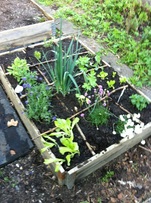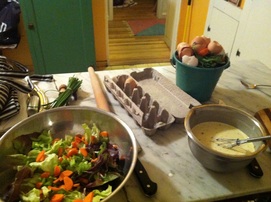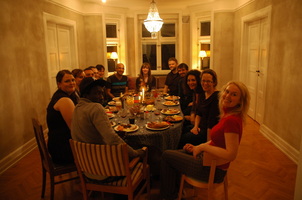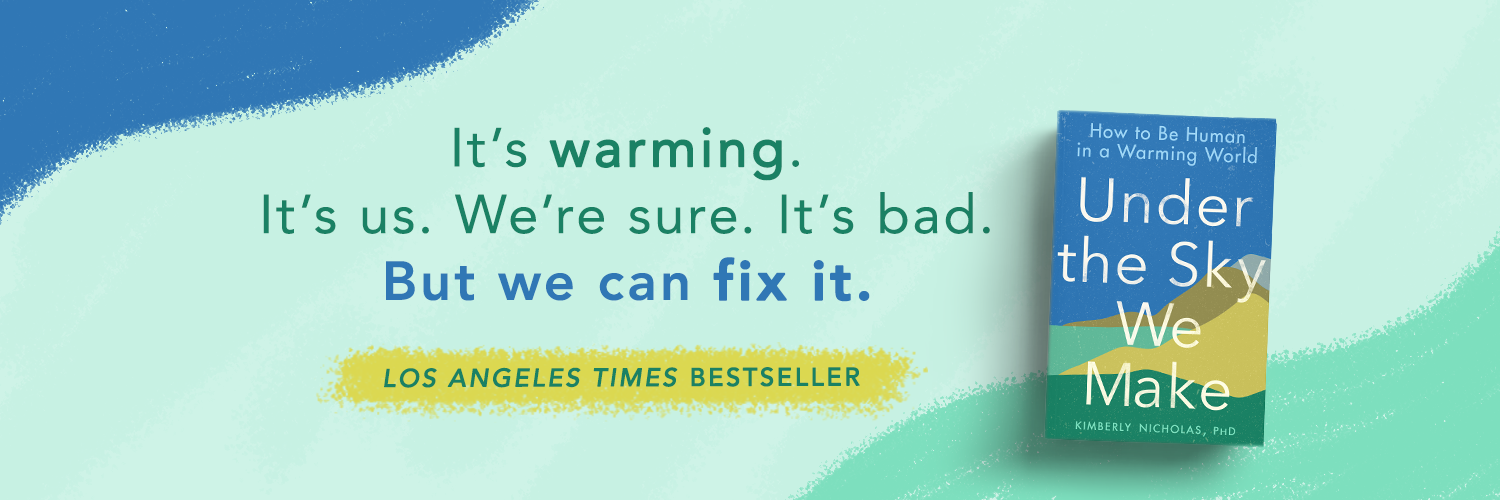One Great Meal
Commencement Address at Lund University
Kimberly A. Nicholas
2 June 2014
Dear family, friends, and colleagues- welcome! Congratulations to the latest graduates of the Lund University International Master’s Programme in Environmental Studies and Sustainability Science, and thank you for giving me this opportunity to address you.
We’re here to celebrate the accomplishments of the 16th graduating class of the LUMES program- or as we call them, Batch 16, as if they were a delicious group of cookies. Well, Batch 16 is now fully baked and ready to be served to the world. And knowing this group, the world had better watch out!
You came to us from 18 countries, and spent two years here in Sweden, learning from and teaching each other, and us. You’ve written tens of thousands of words, on everything from nitrogen pollution to Habermas, in your journey to become critical sustainability scientists. Most recently, probably most traumatically, but hopefully most rewardingly, you’ve written exactly 14,000 words for your thesis, creating and contributing original knowledge towards sustainability. We appreciate and applaud all your hard work and creativity.
Our students have joined us because they’re motivated and passionate about creating a better world. We know the enormous scope of the problems we face, like climate change. But these critical issues can seem too far away to be real, and too big for any one of us to tackle alone. It’s true we need major political, economic, and social transformations to live in a world that’s more sustainable – that is, more healthy, more fair, more wild and more beautiful. These urgent changes won’t happen overnight, but I believe that this world is a bit closer at hand with these 36 new LUMES alumni in it.
However, there is something small but critical that all of us do every day, something I believe holds the key to the health of both ourselves and the planet. We vote with our forks, three times a day, 365 days a year. I want to focus today on food as the source of so many of our problems, and the seed of many solutions.
Let me first ask you to imagine your favorite meal. What does it look like? What does it smell and taste like? Who has made it, and who’s there to enjoy it with you? What traditions does it carry on, what milestones does it celebrate? Food can bring with it a delicious and powerful culture, and helps tell the story of who we are. What is that story saying today?
The simple act of eating is absolutely profound in terms of our health. Over two thousand years ago, Hippocrates said, “Let food be thy medicine,” recognizing good food as the foundation of good health. We now live in an unprecedented time in human history, where what we eat is now the number one determinant of health around the world[1]. More needs to be done, but we’ve been so successful at eradicating and reducing infectious diseases that we’re left with our diet as the main source of our health and well-being, or our illnesses.
Almost a billion people don’t get enough food to eat. This is a terrible waste of human potential, and an inexcusable tragedy, considering that we grow enough food to feed everyone. But even more of us, over two billion people, now get too much to eat, and eat too much unhealthy foods, making us overweight or obese[2], shortening and worsening our lives.
We are what we eat. What are you today, based on what you had for breakfast? Is it something you can count on keeping you healthy and vibrant, to keep you around for many more days of celebration like today? Is it something you can be proud of? Increasingly we are made up of a Western diet of manufactured, empty calorie “food products,” not real food. If this continues, at what point are we no longer real people? These unhealthy foods are literally killing us, contributing to the obesity epidemic, and preventable diseases including heart disease, diabetes, and some cancers.
In terms of the environment, agriculture is the biggest change humans have made to the planet, and of course, food production is absolutely essential for our survival. Agriculture has the potential to provide livelihoods and development, and healthy landscapes, communities, and food. But agriculture today is not reaching that full potential. We use an area the size of South America to grow crops, and an area the size of Africa to raise livestock[3]. The species and ecosystems that form the life support system of our planet are increasingly getting squeezed out. We may try to save water by taking shorter showers- but we use seven times more water for agriculture than we do in our homes.[4] And yet, about a third of all these resources are wasted, as food rots in the fields or on the way to market in developing countries, and in our refrigerators, restaurants, and supermarkets in developed ones. If food waste were a country, it would be the third largest producer of greenhouse gas pollution.[5] You can see that our “foodprint” extends far beyond our plates.
In focusing on producing food at the absolute lowest price, we’ve managed to reduce our spending on food dramatically in the developed world. We spend just 11.5% of our income in Sweden on food, and less than 7% in the US.[6] But this cheap food system comes at a price: we pay for it in the workers it sickens, the animals it barely keeps alive, the air and water pollution it generates, the unhealthy foods it encourages us to overeat.[7] We get what we pay for. If we want more health and sustainability in our food, we have to be willing to value it for high quality as well as quantity. We have to put our money where our mouths are, to support fair and healthy conditions and a living wage for farmers. We can’t blame companies for their unsustainable practices if we keep buying the cheap food they put on the shelves.
We have the power to change our health, and the health of the planet, by changing what and how we eat, shifting towards tasty and authentic foods. A recent scientific review showed that our health could be greatly improved, and healthcare costs substantially reduced, by increasing our consumption of vegetables and fruits (to cover half of our plates at every meal[8]), doubling consumption of seeds and nuts, and cutting our consumption of meat five times over. Since meat uses so much water, land, and resources to produce, this switch would be good for the environment too. Michael Pollan has good advice about what to eat: “Eat food. Not too much. Mostly plants.”[9] Eat food your great-grand parents would have recognized- not highly processed and packaged food products, but delicious, recognizable food that was once alive.
I want to come back to your favorite meal. I have an invitation and a challenge for you. I want to ask you to learn more about this meal. Where does it come from? What cultures does it embody, what traditions does it carry forward, or create? How was it grown- by whom, and under what conditions? Then I invite you to accept a challenge. Before this year is over, make the best, most delicious possible version of this meal for your friends and family. Find the ingredients grown with the most integrity – they will be better for your health, the environment, and your tastebuds. Extra credit if you can shake the hand of the person who grew them, to thank them for all their care and hard work. Double extra credit if you can grow some piece of the meal yourself- even a pot of herbs on the kitchen windowsill is a start, or a tomato on a balcony, or take over your front lawn or an unused parkway and grow some carrots[10]. Plant something you can eat wherever there is sun and space. Take these good ingredients, grown with respect, prepare them with creativity, gather together the people you love around a table, and nourish them with One Great Meal.
This one meal won’t be the end, of course, but the beginning. We need systematic change- more knowledge and skills passed on in the garden and the kitchen, policy and economic changes to make the food system more healthy, fair, and sustainable, better distribution and accessibility of real food. I encourage you all to involve yourself in this important work. But don’t let the perfect be the enemy of the good here. Don’t let your hunger for the big solutions get in the way of something you have the power to do TODAY for yourself, your family, and the planet. Start with dinner tonight and see where it takes you next.
Food has tremendous power to promote personal and planetary health. It’s also one of the great simple pleasures of life. Gathering around a table creates community, identity, laughter, and memories. LUMES graduates, I know you have many great memories of the community you’ve created here, and I bet many of them are centered around food. Remember the times you went apple picking, ventured out into the forest to find mushrooms and berries, had picnics in the park, and hosted potluck dinners where everyone brought a taste of home. I hope you bring a piece of Sweden with you, wherever your next adventures take you - spring asparagus, summer berries, fall mushrooms, and of course, year-round fika with coffee and cinnamon rolls.
LUMES Batch 16, we’re so proud of you today. Please go out and do great things, and let your energy be fueled by great meals. Please share the recipes, stories, and photos of your Great Meal with each other, online and in person, and help use food as a powerful tool for a better world. Keep in touch- and I expect you to send me your recipe for change before December 31st.
Thank you.
Contact: [email protected], @KA_Nicholas
References:
[1] Dr. Christopher Murray, EAT Stockholm Food Forum, 27 May 2014. Data from the University of Washington Institute for Health Metrics and Evaluation. 2014.
Causes of death: http://vizhub.healthdata.org/irank/arrow.php
GBD Compare http://vizhub.healthdata.org/gbd-compare/
[2] One-third world population overweight or obese: Ng et al., 2014, The Lancet doi:10.1016/S0140-6736(14)60460-8. Press release:
http://www.healthdata.org/gbd/news-events/news-releases
[3] Jonathan Foley, May 2014. “A five-step plan to feed the world.” National Geographic. http://www.nationalgeographic.com/foodfeatures/feeding-9-billion/
[4] International Energy Agency. 2012. “Water for Energy: is energy becoming a thirstier resource?” Chapter 17 in the World Energy Outlook 2012. http://www.worldenergyoutlook.org/media/weowebsite/2012/WEO_2012_Water_Excerpt.pdf
[5] Food and Agriculture Organization. 2013. “Food wastage footprint: impacts on natural resources.” Summary Report. http://www.fao.org/docrep/018/i3347e/i3347e.pdf
[6] Food spending: ERS/USDA data mapped by Civil Eats and the UC Berkeley Graduate School of Journalism News21 course on food resporting. http://civileats.com/2011/03/29/mapping-global-food-spending-infographic/
[7] Jonathan Safran Foer. 2009. Eating Animals. Little, Brown and Company: New York. http://www.eatinganimals.com/
[8] Harvard School of Public Health. The Nutrition Source: Knowledge for Healthy Eating.
http://www.hsph.harvard.edu/nutritionsource/
[9] Michael Pollan. “Unhappy Meals.” 28 January 2007. New York Times. http://www.nytimes.com/2007/01/28/magazine/28nutritionism.t.html?pagewanted=all&_r=0
[10] Ron Finley, guerilla gardener. http://ronfinley.com/
Commencement Address at Lund University
Kimberly A. Nicholas
2 June 2014
Dear family, friends, and colleagues- welcome! Congratulations to the latest graduates of the Lund University International Master’s Programme in Environmental Studies and Sustainability Science, and thank you for giving me this opportunity to address you.
We’re here to celebrate the accomplishments of the 16th graduating class of the LUMES program- or as we call them, Batch 16, as if they were a delicious group of cookies. Well, Batch 16 is now fully baked and ready to be served to the world. And knowing this group, the world had better watch out!
You came to us from 18 countries, and spent two years here in Sweden, learning from and teaching each other, and us. You’ve written tens of thousands of words, on everything from nitrogen pollution to Habermas, in your journey to become critical sustainability scientists. Most recently, probably most traumatically, but hopefully most rewardingly, you’ve written exactly 14,000 words for your thesis, creating and contributing original knowledge towards sustainability. We appreciate and applaud all your hard work and creativity.
Our students have joined us because they’re motivated and passionate about creating a better world. We know the enormous scope of the problems we face, like climate change. But these critical issues can seem too far away to be real, and too big for any one of us to tackle alone. It’s true we need major political, economic, and social transformations to live in a world that’s more sustainable – that is, more healthy, more fair, more wild and more beautiful. These urgent changes won’t happen overnight, but I believe that this world is a bit closer at hand with these 36 new LUMES alumni in it.
However, there is something small but critical that all of us do every day, something I believe holds the key to the health of both ourselves and the planet. We vote with our forks, three times a day, 365 days a year. I want to focus today on food as the source of so many of our problems, and the seed of many solutions.
Let me first ask you to imagine your favorite meal. What does it look like? What does it smell and taste like? Who has made it, and who’s there to enjoy it with you? What traditions does it carry on, what milestones does it celebrate? Food can bring with it a delicious and powerful culture, and helps tell the story of who we are. What is that story saying today?
The simple act of eating is absolutely profound in terms of our health. Over two thousand years ago, Hippocrates said, “Let food be thy medicine,” recognizing good food as the foundation of good health. We now live in an unprecedented time in human history, where what we eat is now the number one determinant of health around the world[1]. More needs to be done, but we’ve been so successful at eradicating and reducing infectious diseases that we’re left with our diet as the main source of our health and well-being, or our illnesses.
Almost a billion people don’t get enough food to eat. This is a terrible waste of human potential, and an inexcusable tragedy, considering that we grow enough food to feed everyone. But even more of us, over two billion people, now get too much to eat, and eat too much unhealthy foods, making us overweight or obese[2], shortening and worsening our lives.
We are what we eat. What are you today, based on what you had for breakfast? Is it something you can count on keeping you healthy and vibrant, to keep you around for many more days of celebration like today? Is it something you can be proud of? Increasingly we are made up of a Western diet of manufactured, empty calorie “food products,” not real food. If this continues, at what point are we no longer real people? These unhealthy foods are literally killing us, contributing to the obesity epidemic, and preventable diseases including heart disease, diabetes, and some cancers.
In terms of the environment, agriculture is the biggest change humans have made to the planet, and of course, food production is absolutely essential for our survival. Agriculture has the potential to provide livelihoods and development, and healthy landscapes, communities, and food. But agriculture today is not reaching that full potential. We use an area the size of South America to grow crops, and an area the size of Africa to raise livestock[3]. The species and ecosystems that form the life support system of our planet are increasingly getting squeezed out. We may try to save water by taking shorter showers- but we use seven times more water for agriculture than we do in our homes.[4] And yet, about a third of all these resources are wasted, as food rots in the fields or on the way to market in developing countries, and in our refrigerators, restaurants, and supermarkets in developed ones. If food waste were a country, it would be the third largest producer of greenhouse gas pollution.[5] You can see that our “foodprint” extends far beyond our plates.
In focusing on producing food at the absolute lowest price, we’ve managed to reduce our spending on food dramatically in the developed world. We spend just 11.5% of our income in Sweden on food, and less than 7% in the US.[6] But this cheap food system comes at a price: we pay for it in the workers it sickens, the animals it barely keeps alive, the air and water pollution it generates, the unhealthy foods it encourages us to overeat.[7] We get what we pay for. If we want more health and sustainability in our food, we have to be willing to value it for high quality as well as quantity. We have to put our money where our mouths are, to support fair and healthy conditions and a living wage for farmers. We can’t blame companies for their unsustainable practices if we keep buying the cheap food they put on the shelves.
We have the power to change our health, and the health of the planet, by changing what and how we eat, shifting towards tasty and authentic foods. A recent scientific review showed that our health could be greatly improved, and healthcare costs substantially reduced, by increasing our consumption of vegetables and fruits (to cover half of our plates at every meal[8]), doubling consumption of seeds and nuts, and cutting our consumption of meat five times over. Since meat uses so much water, land, and resources to produce, this switch would be good for the environment too. Michael Pollan has good advice about what to eat: “Eat food. Not too much. Mostly plants.”[9] Eat food your great-grand parents would have recognized- not highly processed and packaged food products, but delicious, recognizable food that was once alive.
I want to come back to your favorite meal. I have an invitation and a challenge for you. I want to ask you to learn more about this meal. Where does it come from? What cultures does it embody, what traditions does it carry forward, or create? How was it grown- by whom, and under what conditions? Then I invite you to accept a challenge. Before this year is over, make the best, most delicious possible version of this meal for your friends and family. Find the ingredients grown with the most integrity – they will be better for your health, the environment, and your tastebuds. Extra credit if you can shake the hand of the person who grew them, to thank them for all their care and hard work. Double extra credit if you can grow some piece of the meal yourself- even a pot of herbs on the kitchen windowsill is a start, or a tomato on a balcony, or take over your front lawn or an unused parkway and grow some carrots[10]. Plant something you can eat wherever there is sun and space. Take these good ingredients, grown with respect, prepare them with creativity, gather together the people you love around a table, and nourish them with One Great Meal.
This one meal won’t be the end, of course, but the beginning. We need systematic change- more knowledge and skills passed on in the garden and the kitchen, policy and economic changes to make the food system more healthy, fair, and sustainable, better distribution and accessibility of real food. I encourage you all to involve yourself in this important work. But don’t let the perfect be the enemy of the good here. Don’t let your hunger for the big solutions get in the way of something you have the power to do TODAY for yourself, your family, and the planet. Start with dinner tonight and see where it takes you next.
Food has tremendous power to promote personal and planetary health. It’s also one of the great simple pleasures of life. Gathering around a table creates community, identity, laughter, and memories. LUMES graduates, I know you have many great memories of the community you’ve created here, and I bet many of them are centered around food. Remember the times you went apple picking, ventured out into the forest to find mushrooms and berries, had picnics in the park, and hosted potluck dinners where everyone brought a taste of home. I hope you bring a piece of Sweden with you, wherever your next adventures take you - spring asparagus, summer berries, fall mushrooms, and of course, year-round fika with coffee and cinnamon rolls.
LUMES Batch 16, we’re so proud of you today. Please go out and do great things, and let your energy be fueled by great meals. Please share the recipes, stories, and photos of your Great Meal with each other, online and in person, and help use food as a powerful tool for a better world. Keep in touch- and I expect you to send me your recipe for change before December 31st.
Thank you.
Contact: [email protected], @KA_Nicholas
References:
[1] Dr. Christopher Murray, EAT Stockholm Food Forum, 27 May 2014. Data from the University of Washington Institute for Health Metrics and Evaluation. 2014.
Causes of death: http://vizhub.healthdata.org/irank/arrow.php
GBD Compare http://vizhub.healthdata.org/gbd-compare/
[2] One-third world population overweight or obese: Ng et al., 2014, The Lancet doi:10.1016/S0140-6736(14)60460-8. Press release:
http://www.healthdata.org/gbd/news-events/news-releases
[3] Jonathan Foley, May 2014. “A five-step plan to feed the world.” National Geographic. http://www.nationalgeographic.com/foodfeatures/feeding-9-billion/
[4] International Energy Agency. 2012. “Water for Energy: is energy becoming a thirstier resource?” Chapter 17 in the World Energy Outlook 2012. http://www.worldenergyoutlook.org/media/weowebsite/2012/WEO_2012_Water_Excerpt.pdf
[5] Food and Agriculture Organization. 2013. “Food wastage footprint: impacts on natural resources.” Summary Report. http://www.fao.org/docrep/018/i3347e/i3347e.pdf
[6] Food spending: ERS/USDA data mapped by Civil Eats and the UC Berkeley Graduate School of Journalism News21 course on food resporting. http://civileats.com/2011/03/29/mapping-global-food-spending-infographic/
[7] Jonathan Safran Foer. 2009. Eating Animals. Little, Brown and Company: New York. http://www.eatinganimals.com/
[8] Harvard School of Public Health. The Nutrition Source: Knowledge for Healthy Eating.
http://www.hsph.harvard.edu/nutritionsource/
[9] Michael Pollan. “Unhappy Meals.” 28 January 2007. New York Times. http://www.nytimes.com/2007/01/28/magazine/28nutritionism.t.html?pagewanted=all&_r=0
[10] Ron Finley, guerilla gardener. http://ronfinley.com/




